 |
Real Estate appreciation in
value
May 9th 2018
by Alex Kay
|
|
 |
Real Estate appreciation is usually
the benchmark used to determine how healthy a market is and also
if it is wise to invest in that market. However this approach is
flawed because the data on hand is attempting to cover too many
variables and in any case is unreliable and this is why...
Statistics for the increase in value of the average condo,
townhouse or detached home are usually taken from the total
volume of sales (so the combined values of all the properties
purchased within the area) and then simply divided by the number
of properties sold. This will result in the average value per
transaction. Its a legitimate statistic and is a correct one but
how can it be used by the public other than the reassurance that
the market is healthy?
The average value of a home and
its statistical increase or decrease in relation to the previous
year has in fact very little to do with this number. In fact it
merely serves as a guidance as to what to expect from the market
in the coming months all things being equal. If the market
changes, this statistic is useless. Even if the market is the
same, it is not a number that should be used to evaluate a
property, not should it be used to second guess any properties
increase in value over the coming years. In fact, it shouldn't
be used at all as a reliable way to determine if buying real
estate is a good investment other than by using its most
conservative value of 1% or 2% per annum.
The first
reason behind this is that there is a difference between
purchasing real estate as an investment and owning a home. A
home IS an investment but it should not be purchased on that
basis. You want a home to be about what you want and your
lifestyle, not as the best value you can find unless you happen
to luck-in. If you are like most home owners, you will own
several properties throughout your life and they will go up or
maybe occasionally down depending on the market. However you
can't really plan on making money off it because you are largely
going to be subjected to the property market around you over
which you have very little control.
Actually investing in
Real Estate is a different game. It is a science based on the
original investment and its return, which can be predicted using
a much more reliable set of statistics. This is less about what
you want but what you can get. You will approach this with your
head, not with your heart and this changes EVERYTHING!.
Any Return on Investment in real estate is determined based on
the purchase price relative to market value, on the rental
income, projected rental income, and on a very conservative
increase in value of 2%. The purchase price relative to market
value is very important as is can immediately produce an
increase in your net worth just by knowing what a property is
worth. This is much easier with Condos than with houses are
large buildings with many sold comparable properties mean that
an average value is much more reliable to calculate than with a
detached home.
The rental income is easy to calculate as
in Quebec especially, using a minimal value is quite easy. The
bonus will come in the form of an increase in value but we don't
need to make such predictions to ensure a viable investment.
Mortgage rates are an important factor as the best return on
investment will come from borrowing between 70% and 80% of the
value of the property to take advantage of current low rates and
fix them for 5 years and use the princibles of leveraging to
maximise the ROI.
With such calculations in mind, the
overall Return on Investment over a 5 year period has much less
to do with a 5% per annum market growth and much more to do with
accurate calculations which will usually reveal between 10% and
15% Return on investment over a 5 year period.
|
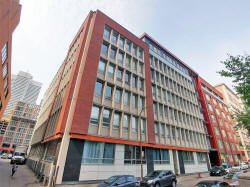 |
The Lofts St Alexandre is a Condo
building with many great amenities such as a pool, a gym
and a rooftop terrace. More importantly, it has very low
condo/strata fees which makes it ideal for a Real Estate
investor.
|
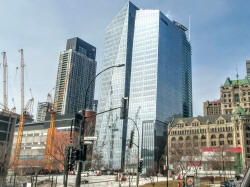 |
The Deloitte building next to the Tour des Canadiens was
the first commercial tower to be built in 30 years.
This was the first of several new commercial
constructions to go up since 2015 and are a clear
indicaiton of a reversal of fortunes in the Montreal
economy. |
|
 |
Buy Vs Rent
April 24th 2018
by Alex Kay
|
|
 |
The eternal dilemma for the first
time buyer is whether to continue renting or to take a leap of
faith and buy a property.
Well the thing is that it doesn’t
have to be a leap of faith at all. It's a decision that can be
based on facts, not to mention one's ability to make use
of money should you not be using it to invest in Real Estate.
First of all, for being very much
involved in real estate, I can say that with a few exceptions, if
confronted with the option to either rent or buy today, with a
20% downpayment, your costs of owning a condo (including condo/strata
fees, municipal and school taxes) will be roughly the same as
renting a similar unit, +/- $100 per month.
It would be fair to add though that more often than not, any
advantage between renting and buying will be with the tenant in
terms of cashflow. Lets not pretend otherwise, it is usualy a
little cheaper to rent like for like, than to own a property
with a mortgage. So for the purpose of this exercise, let’s
say that the tenant is on average $150 better off per month for
choosing to rent rather than to buy.
This analysis would not be
complete if we weren't to also take into account one's ability
to generate money with those sums would otherwise be invested in real
estate.
CASE STUDY (with an 80% mortgage)
So
let’s use the example a $350,000 condo in Downtown Montreal, and it’s equivalent rental
apartment. The expected cost of ownership assuming a twenty
percent downpayment of $70,000 with closing costs of $5,000
would be a total of $75,000, and assuming 1% of the value of the
condo for taxes and the same again for condo fees, and the cost
for a 30 year mortgage for 5 years at 3.49%, the total holding
cost would be $3,500 + $3,500 + $1,250 = $1,950. These days, a
non furnished one bedroom unit worth $350,000 would rent for
around $1,800 (so with a $150 advantage from a cashflow
perspective).
It should first be noted that of the
$1,950 ownership costs, there is about $500 a month of mortgage
repayment (so $6,000 a year). In addition to that, a $350,000
condo increases in value at least 2% more over a 12 month
period (capital gains). So after 12 months, your original investment of $75,000
has now become $75,000 + $6,000 + $7,000 = $88,000 so that's a
17% ROI (return on investment)
Lets now take the rental option. There is no
capital gain but you are saving $150 per month for a total saved of
$1,800 per year. If we assume that you have invested $75,000 in
a fund which historically gets 7% annual growth, then this money
is earning $5,250 per year. Therefore, on a yearly basis we are
looking at $75,000 +
$5,250 + $1,800 = $82,050 or 9.4% ROI.
So if you start with $75,000, and decide to rent rather than to
buy, your net worth will increase by just over half of what it
would if you decide to buy a property.
I know that funds can get more than 7%
ROI sometimes, but Real Estate may also grow more than 2%. This
is the interesting part of investing in real estate because any
growth in capital gains is based on the value of the property
and not on the amount you have invested. So with a 20%
downpayment, an additional 1% growth in the value of your
property translates into an additional 5% ROI on your original
investment.
It should also be added that your main or
primary residence is not subject to taxes whereas any gains on
the value of other assets is usually taxable.
|
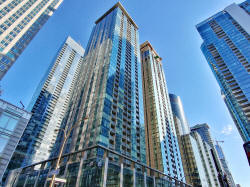 |
The Roccabella building is still top of
the searches on Google as it enjoys a top reputation
amongs buildlings in the city. Other popular buildings
are Cours Mont Royal, 1200 Ouest, Tour des Canadiens,
and Southam Lofts. These are all good pointers as to
what buyers are looking for.
|
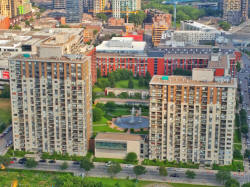 |
|
The Jardins Windsor or Windsor Gardens is a large
development in Griffintown (or Little Burgandy). There
is significant investment in the area and whilst many
new developments are going up just a stones throw away,
the are arguable all better equipped with superior
materials. It remains to be seen if this is going to
help these condos increase in value or if their
neighbouring towers are going to make them look bad.
They do represent an good return on investment from a
rental perspective however. |
|
 |
The Downtown Montreal Real
Estate Market Update 2018 Q1
April 15th 2018
by Alex Kay
|
|
 |
After a
very strong performance in 2016 and 2017, and with strong
underlying economic data, there was every reason to believe that
this year would be even better. Although its difficult to tell
at this time of the year and draw any reasonable conclusions,
all signs point to yes.
The first sign of a strong resale
market is that the new buildings (as in’ recently finished’) are
selling at a much faster rate than in previous years. To
clarify, in previous years, it would take at least twelve months
for the values in a new building to settle, and whilst there are
still some interesting examples of good deals, sales are strong
and values are holding. Of course, the danger in drawing early
conclusions for units that were purchased on the basis of their
gross square footage and then resold using their net square
footage which typically is about 15% less, is that the price per
square foot automatically increases by 15% even if the unit is
re-sold at the same price. A fact not lost on developers who are
a little too keen to make the most of such statistics.
Budgets are noticeably higher than last year , by at least 20%
for Downtown Montreal, though this doesn’t automatically boost
values at the lower end of the price range, it does help in
increasing prices in the middle range and this will eventually
push prices up all across the entire spectrum. Baby steps...
Montreal is about to make it to the big league so lets not rush
it.
Although down in numbers, presumably
due to the increasing shortage of land on which to build, new
projects are still bring planned in all parts of the city. This
will translate into an increase in values as these will
inevitably sell for a higher price per square foot than their
predecessors.
Overall, the only question is how the
rise in interest rates will affect buying power and the ROI (
return on investment) for investors.
In three
months, and with the spring season behind us, we will have a
much better idea, but at the risk of being smart after the
event. The future belongs to the bold. Delaying your purchase is
effectively betting against the market, which based on current
data, would be unwise.
|
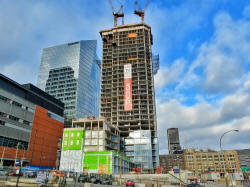 |
The Tour des Canadiens Phase 2 is in its closing stages
with most of the structure being erected. However, bad
press on Air B&B and short term rentals as well as a
question mark over the boast of it being the 'best
investment in the city' may be the cause for a decline
in sales for Phase 3, as well as competition from
earlier buildings.
|
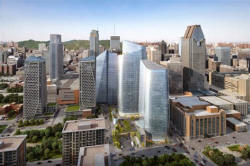 |
|
The Windsor Quad commercial development will bring
hundreds, if not thousands of jobs to the area between
the downtown core and Griffintown. |
|
|



